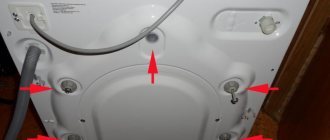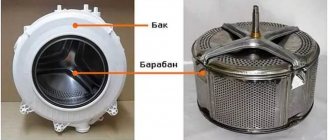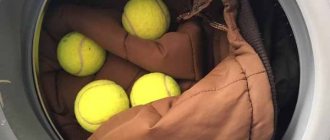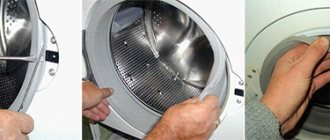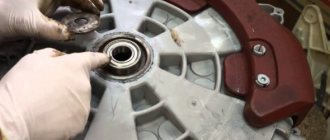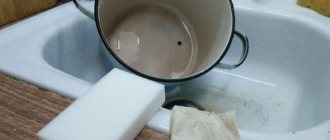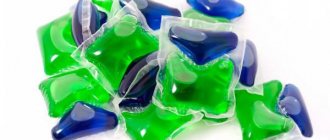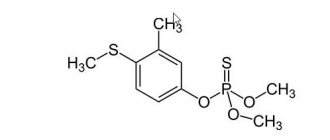Premature failures of tubular electric heaters of washing machines occur due to the deposition of a kind of fur coat on the surface of the elements, which causes overheating and destruction of the device. This explains the need to use “Anti-scale agents” when washing – substances that counteract a phenomenon harmful to the heater. To combat scale, chemical products from domestic and foreign manufacturers are offered; some users use traditional methods.
- Causes of formation and diagnosis of scale
- Formulations of deposit salts and cleaners
- Range of products
- Traditional methods of combating plaque
- Mechanical cleaning method
- Prevention of carbonate and sulfate precipitation
- Conclusions on the effectiveness of resisting salt formation
- Consumer Reviews
Causes of formation and diagnosis of scale
Solid deposits deposited on the heating surface from water with hardness salts dissolved in it are called scale. The intensity of the growth of the sedimentary layer on the heating element depends on the degree of heating of the device, the time of use of the washing machine and the quality of the water.
Are you unplugging your washing machine?
Oh yes! No
Excessive deposit formation is determined by the following characteristics:
- unpleasant odor from washed clothes and inside the drum;
- clothes are poorly cleaned, light-colored items take on a grayish tint;
- hum from the machine when the electric heater is on;
- the water temperature does not correspond to the set program - the hatch glass is cold throughout the entire cycle;
- the powder consumption is increased: you have to pour more to compensate for the insufficient heat transfer of the heating element.
Anti-scale option
If you find any irregularities in the wash quality, you need to inspect the heating element - it is located at the bottom of the tank. To see the heating element, you need to look through the holes in the drum, highlighting it with a flashlight.
Cause of scale formation
The most vulnerable element in terms of the appearance of limescale is the heating element. The reason is constant contact with water. The level of scale accumulation depends on its composition. The harder the water flows from the water supply, the more susceptible machine parts are to failure.
Housewives try to use all possible means to eliminate the problem. Moreover, both folk and industrially developed drugs are used.
Formulations of deposit salts and cleaners
Scale greatly reduces the thermal conductivity of the metal. Removal of crust from the surface of the heater is carried out using mechanical and chemical methods. Based on the composition of the substances that make up the build-up, there are 3 main types of scale:
- carbonate – Ca and Mg salts from carbon dioxide: CaCO3, MgCO3;
- sulfate – calcium derivative of sulfuric acid: CaSO4;
- silicate – silicic acid compounds Ca, Mg, Fe, Al.
Do you wash by hand?
Oh yes! No
To eliminate build-up on the heating elements of washing machines, the chemicals “Antiscale”, “Scaling Precipitator”, and “Antiscale” are used. Preparations are made in the form of liquid suspensions, powders, tablets and pastes.
The cleaners are based on acids: sulfamic, citric, oxalic. Mandatory ingredients are ammonium chloride and thiourea, as well as additives: flavorings, dyes.
Expert opinion
I work in the household appliance repair industry. Extensive experience in restoring washing machines and dishwashers.
Ask a Question
Antiscale is not intended to soften water during washing - its purpose is to soften and remove mineral build-up from metal.
The procedure for cleaning surfaces from scale is carried out at idle speed at a water temperature of 30–60ºС - the laundry is not loaded. The suspension or powder is placed in the drum of the machine or a standard cuvette for detergents. To avoid chemical burns, wear latex gloves when handling the scale precipitator.
Antiscale
How to clean heating elements with anti-scale
There are 2 ways to clean a washing machine:
- Pour (pour) the required dose into the drum.
- Pour (pour) into a dispenser container.
At the same time, there should be no underwear in the SM.
Step-by-step instruction
- Wear gloves.
- Load the product (quantity according to the manufacturer's instructions).
- Start the wash.
- After completing the process, check the filter for the presence of scale fragments.
- Set up the extra rinse process.
Do not overdo the quantity so as not to break the machine. Clean 2-3 times a year.
Range of products
On the market of chemical products for descaling washing machines there are many offers from companies in different countries. To characterize the most popular Antinakipinov brands, descriptions are given by manufacturer groups.
Products from domestic manufacturers
This is the most representative category of cleaners in demand. Inexpensive and effective drugs can be purchased at any household chemical store. Here are the first 5 brands:
- Luxus Professional is a liquid cleaner based on aminosulfonic and citric acids. Packaging 500 ml, enough for 2 treatments.
- Selena - available in two forms: emulsion and powder. The recommended cleaning wash temperature is 30–40ºС, frequency of use is quarterly. Violations of the regulations lead to the risk of destruction of the seals.
Do you store laundry in the washing machine?Oh yes! No.
- Cinderella - most often found in liquid form, but is also available in powder. One 250 ml bottle is poured into the drum without laundry and the mode is set to 40–50ºС.
- "Scrubman" - recommended for monthly use. In addition to descaling, it disinfects and removes odors from the drum, and prevents the formation of fungus and mold. Dosage – 250 g of powder is needed for a machine with a 6 kg tank.
- Un Momento is a concentrated liquid, available in single packaging. The drug is non-toxic and safe for rubber and plastic parts. Cleans at a temperature of 60ºС.
You can also call the brand “Greenfield Rus”, the drug removes limescale well. But the powder has a significant drawback: the packaging is 250 g, and 60 g are needed for 1 cleaning. Exceeding the dosage harms the machine.
Antiscale for SMA
Foreign cleaning powders and liquids
Among the anti-scale agents produced in the near abroad, a powdered cleaner from Ukraine “Furman” in 40 g bags is called. This dose is enough to remove scale from a heating element in 1 cycle at a temperature of 60ºC. The drug is easy to use and inexpensive.
Belarusian famous brands are Doctor TEN and Chistoff. A distinctive feature of the first drug: an antibacterial effect in addition to the main function of cleaning the electric heater from salt deposits.
The second anti-scale agent contains hydrochloric acid, which is highly aggressive, so the cleaner is used less frequently than the first. Scale solvents from foreign countries:
- Topper from Italy. Recommended by washing machine manufacturers Miele and Bosch. The main cleaning agent is anhydrous citric acid. The safety of rubber parts is ensured by the inclusion of acid sulfite in the composition of the preparation. Used at 60ºС at intervals of 1–3 times a year.
- Magic Power, Germany. Designed to destroy old hard crusts. It is produced in 2 forms: powder and liquid.
The jointly produced anti-scale products include the Top-Hous brand (Germany/Russia). The powder form of the drug is produced in our country, and the gel form is produced abroad. You can also note the products of Bork, Nast, W5, Tygon factories.
Types of anti-scale products, user reviews
To choose a really working anti-scale agent, you should familiarize yourself with the composition and reviews of some brands common on the household chemicals market.
"Cinderella"
Cinderella is available in both powder and liquid form. The latter is more common than powder. A standard bottle holds 0.25 liters. One bottle is used for one cleaning procedure.
To descale SMA, you need to pour the contents of the bottle into the drum without laundry and run a wash cycle with a temperature between 40-50 degrees.
Un Momento
How to use anti-scale for washing machines
Anti-scale Un Momento is a concentrated liquid that, according to the manufacturers, quickly removes limescale and does not harm the plastic and steel parts of the SMA. Among the features we note the following:
- Recommended for use by leading brands of washing machines.
- Non-toxic, harmless.
- Without fillers and ballast components.
- Available in disposable packaging.
It is used like this: pour 3 doses of the product into an empty drum, start the washing mode at 60 degrees, wait until the end of the program.
The composition contains organic food acids, special food mixtures of alkali metal salts and prepared water.
Scrubman
The manufacturer positions Scrubman as anti-scale agent No. 1. Suitable for removing scale from all washing machines. Available in packages of 250 g. Contains organic acid and complexing agent.
Review:
Hello. Having bought an automatic car, I immediately thought about combating water hardness. My husband suggested installing a filter, but I prefer manual methods of fighting - it’s cheaper. I’ve been using Scrubman for over a year now – I run the machine with it once a month and have no problems. Of course, I take out the laundry and only put it in the empty bin! Washing temperature – 60 degrees. I have tested this product over time and I can confidently say that it works. The price of the product in my store near my house is only 65 rubles; I saw it more expensive in the supermarket, but still not more than a hundred. I recently found a liquid half-liter version - even more convenient and economical.
Elena, Tver.
Chistoff
Belarusian descaling agent with a “thermonuclear” composition: purified water, hydrochloric acid, sodium laureth sulfate, dye. After studying customer reviews, we came to the conclusion that even with such an aggressive composition, the product cannot cope with cleaning large layers of scale. Therefore, it is hardly worth taking risks and buying such aggressive chemicals with such minimal effect.
Traditional methods of combating plaque
At home, they use products available in every kitchen: citric acid and vinegar. When performing cleaning, it is important to observe the dosage, exposure time and temperature of the solution. Work order:
- Solvent – citric acid. The frequency of treatment is once every 4–6 months, the amount of powder for the machine per 5 kg of laundry is 100 g. Select a long mode with high temperature, do not load things into the drum. After rinsing, wipe the drum and clean the drain filter from solid deposits.
- Acetic acid works effectively, but is rarely used due to its pungent odor and the danger of damaging the seal. To soften the scale, pour 200 g of vinegar into the drum, and another 1/3 cup into the powder compartment. Use a 90ºC program with a long wash cycle. The procedure is completed in the manner described above: rinsing and checking the pump filter.
Expert opinion
I work in the household appliance repair industry. Extensive experience in restoring washing machines and dishwashers.
Ask a Question
There is an option that is not entirely correct to call folk. You can make Anti-Scalp yourself from a fizzy drink: pour 3–5 liters of expired Coca-Cola into the empty drum of the machine. The cleaning technology is similar to those given above. The solution temperature is 60ºС.
Mechanical cleaning method
It is not recommended to disassemble a washing machine with a valid warranty. The right to service without payment will be lost. For manual descaling, the heating element is dismantled:
- disconnect equipment from the power supply;
- remove the back panel of the washing machine;
- Release the heater from its fastenings and remove it outside.
Clean the heating element using a spatula using gentle scraping movements, being careful not to touch the metal. To make the task easier, you can first soak the device in Antiscale.
Do not use a knife, file, or wire brush. Reassembling the machine is carried out in the reverse order.
Prevention of carbonate and sulfate precipitation
The appearance of deposits is slowed down by following the manufacturers' recommendations for the operation of SMA: wash in a heating mode of <60ºC, use powders that include anti-scale additives. Excessive loads and incorrectly chosen mode also accelerate the formation of deposits.
Other areas of prevention:
- reduce water hardness using softening filters and demagnetizers;
- refuse to wash heavily worn clothes: fabric particles settle on the heating element;
- do not use powders from an unknown manufacturer;
- Regularly clean the pump filter from accumulated debris.
It is not recommended to use Calgon for prophylaxis for a long time: the substances it contains gradually accumulate on the surface of the heating element and are cemented into a crust of even greater hardness. The result will be known - destruction of the heater.
Conclusions on the effectiveness of resisting salt formation
Periodic washing of the washing machine with Antiscale is a prerequisite for extending its service life. The use of citric acid and vinegar instead of industrial preparations is not prohibited.
Manufacturers of household appliances take into account the influence of scale when developing new programs: they provide heating to 40–50ºС while maintaining the quality of washing at the same high level. This ensures the integrity of the heating element and energy savings. Final wishes to users:
- install a filter-softener at the water inlet to the washing machine, use “Antinakipin”;
- once every six months or after each anti-scaling treatment, clean the pump filter from dirt;
- choose a program with a lower water heating temperature.
And in conclusion: “anti-scale” is a good product that quickly cleans washing machine parts from carbonate and sulfate build-ups. But you need to remember that overdose and improper use will lead to collateral destruction of the seals.
Video
Action of antiscale
Cleaning a washing machine with anti-scale occurs due to the action of active components. They operate in two different directions. By softening water, the product promotes the decomposition of lime and salt deposits.
Tap water has a different composition, but it invariably contains various elements that cause deposits. Antiscale affects harmful particles, desalinating water.
Any descaler contains acids, most often sulfamic acids. In addition, each manufacturer can modify the auxiliary components, but ammonium chloride and thiourea remain unchanged.
The flavorings present in the composition give a pleasant aroma, and the dye is added as a release agent in clear water. For additional impact and preventive effect, manufacturers add other components, which must be indicated on the packaging.
